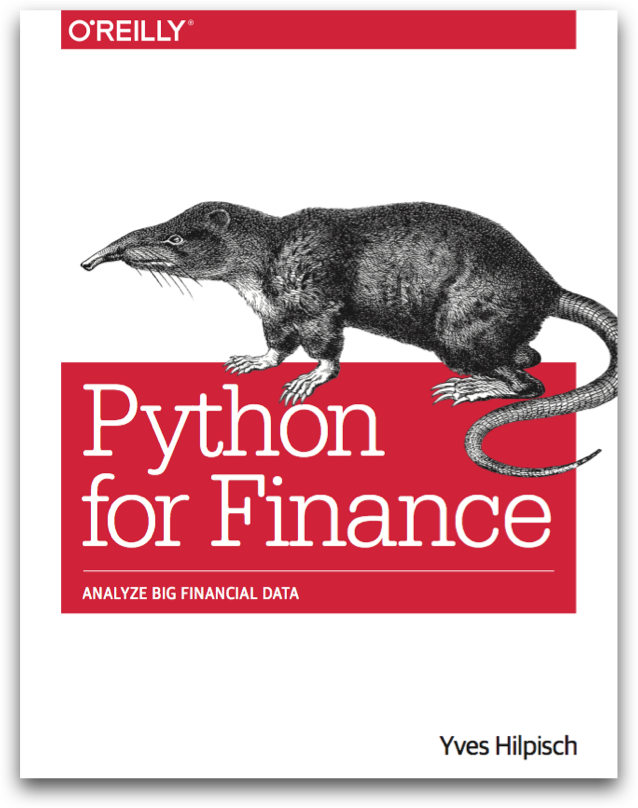Python for Finance (O'Reilly)
This repository provides all Python codes and Jupyter Notebooks of the book Python for Finance -- Analyze Big Financial Data by Yves Hilpisch.
Oder the book here http://shop.oreilly.com/product/0636920032441.do or under http://www.amazon.com/Python-Finance-Analyze-Financial-Data/dp/1491945281/.
There are two code versions available: for Python 3.6 and Python 2.7 (in the legacy folder; not maintained anymore).
Python Packages
There is now a yaml file for the installation of required Python packages in the repository. This is to be used with the conda package manager (see https://conda.io/docs/user-guide/tasks/manage-environments.html). If you do not have Miniconda or Anaconda installed, we recommend to install Miniconda 3.6 first (see https://conda.io/miniconda.html).
After you have cloned the repository, do on the Linux/Mac shell:
cd py4fi
conda env create -f py4fi_conda.yml
source activate py4fi
cd jupyter36
jupyter notebook
On Windows, do:
cd py4fi
conda env create -f py4fi_conda.yml
activate py4fi
cd jupyter36
jupyter notebook
Then you can navigate to the Jupyter Notebook files and get started.
Yahoo! Finance & Google Finance Issues
Recently Yahoo! Finance stopped their original financial data API service that is used in the book in many different places (and been so by many others in the field for years) via the pandas-datareader package.
One way of fixing it in some places is to simply replace data_source='yahoo' by data_source='google' (and maybe working with an alternative symbol). However, Google Finance has also changed data availability via the their API such that this does only help partially.
Another way is to use this fix: https://github.com/ranaroussi/fix-yahoo-finance -- this is done for some code in chapter 11.
In the majority of cases where financial data is used, the pandas-datareader based code has been replaced by simple pandas code that accesses data files that are now part of the repository (CSV data files provided with data as provided either by the Thomson Reuters Eikon API or by data sources from FXCM Forex Capital Markets Ltd.). This makes sure that the code base is not subject to unforeseen API changes by third parties.
Quant Platform
You can immediately use all codes and Jupyter Notebooks by registering on the Quant Platform under http://oreilly.quant-platform.com.
Python for Algorithmic Trading Course & Certificate
Check out our Python for Algorithmic Trading Course under http://pyalgo.tpq.io.
Check out also our Python for Algorithmic Trading Certificate Program under http://certificate.tpq.io.
Company Information
© Dr. Yves J. Hilpisch | The Python Quants GmbH
The Quant Platform (http://pqp.io) and all codes/Jupyter notebooks come with no representations or warranties, to the extent permitted by applicable law.
http://tpq.io | [email protected] | http://twitter.com/dyjh
Quant Platform | http://oreilly.quant-platform.com
Derivatives Analytics with Python (Wiley Finance) | http://derivatives-analytics-with-python.com
Python for Finance (O'Reilly) | http://python-for-finance.com
Python for Algorithmic Trading Course | http://pyalgo.tpq.io
Python for Finance Online Training | http://training.tpq.io



